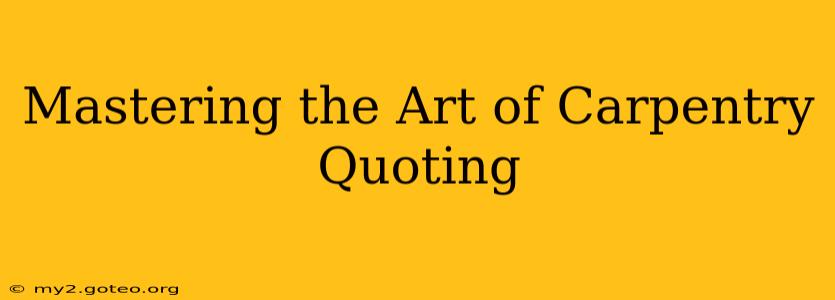Mastering the Art of Carpentry Quoting: A Comprehensive Guide
Accurate and competitive carpentry quoting is crucial for success in the industry. It’s not just about adding up materials and labor; it's about understanding your costs, your client's needs, and the market landscape. This guide delves into the key aspects of crafting winning carpentry quotes that secure projects and ensure profitability.
What factors should I include when calculating the cost of a carpentry project?
Accurately estimating the cost of a carpentry project involves a multi-faceted approach. You need to consider both direct and indirect costs. Direct costs include materials (wood, fasteners, adhesives, finishes), labor (your time and potentially subcontractors), and any specialized equipment rentals. Indirect costs encompass overhead (insurance, vehicle maintenance, office supplies), permits, and potential unforeseen expenses (material waste, repairs). Detailed itemized lists are essential for transparency and to avoid overlooking crucial expenses. Don’t forget to factor in profit margins! A thorough understanding of your hourly rate and material costs is the foundation of accurate quoting.
How do I estimate the time required for a carpentry project?
Time estimation is as crucial as material costing. Break down the project into smaller, manageable tasks. For each task, consider the complexity, required tools, and your experience level. Use timers to track your work on similar projects to develop a more accurate sense of your productivity. Don't underestimate the time needed for cleanup and transportation. Experienced carpenters often build in a buffer for unexpected delays or complications. Learning to accurately estimate time improves efficiency and avoids costly project overruns.
What is the best way to present a carpentry quote to a client?
Presentation matters. A professional-looking quote builds client confidence. Use clear, concise language and avoid technical jargon. Your quote should be well-organized, easy to read, and include all relevant details: project description, itemized costs (materials, labor, overhead, and taxes), payment schedule, and project timeline. Include your contact information and business details. A clean, branded quote reflects your professionalism and increases your chances of securing the job. Consider offering different options or packages to cater to varied client budgets.
How can I price my carpentry services competitively?
Competitive pricing requires market research. Research what other carpenters in your area charge for similar services. Consider your experience, skill level, and the quality of materials you use when setting your rates. While undercutting competitors might seem appealing, ensure your pricing reflects the value you provide. Focusing on high-quality workmanship and excellent customer service can justify slightly higher prices. Remember that consistent profitability is more important than winning every bid.
How do I handle changes to a carpentry project after the quote has been issued?
Changes are inevitable. Establish a clear process for handling project modifications. Document all changes in writing, clearly outlining the impact on costs and the timeline. Provide revised quotes for any additional work or material requirements. This transparent approach protects both you and the client from misunderstandings and ensures that everyone is on the same page. Maintaining detailed records is vital for managing revisions efficiently.
What are common mistakes to avoid when quoting carpentry projects?
Several common mistakes can jeopardize your profitability. Underestimating time and materials is a frequent issue. Failing to include all costs (overhead, permits, taxes) can lead to losses. Lack of a clear contract or scope of work can cause disputes. Ignoring potential challenges or unforeseen circumstances also leads to problems. Regularly reviewing your quoting process and seeking feedback from colleagues can help identify areas for improvement.
How can I improve my carpentry quoting skills over time?
Improving your quoting skills is an ongoing process. Track your actual costs against your estimates to identify areas where you consistently over or underestimate. Seek mentorship from experienced carpenters. Attend workshops or online courses on business management and estimating. Stay updated on industry trends and material costs. The more experience you gain, the more accurate and efficient your quoting process will become. Continuously refining your methods is key to long-term success.

